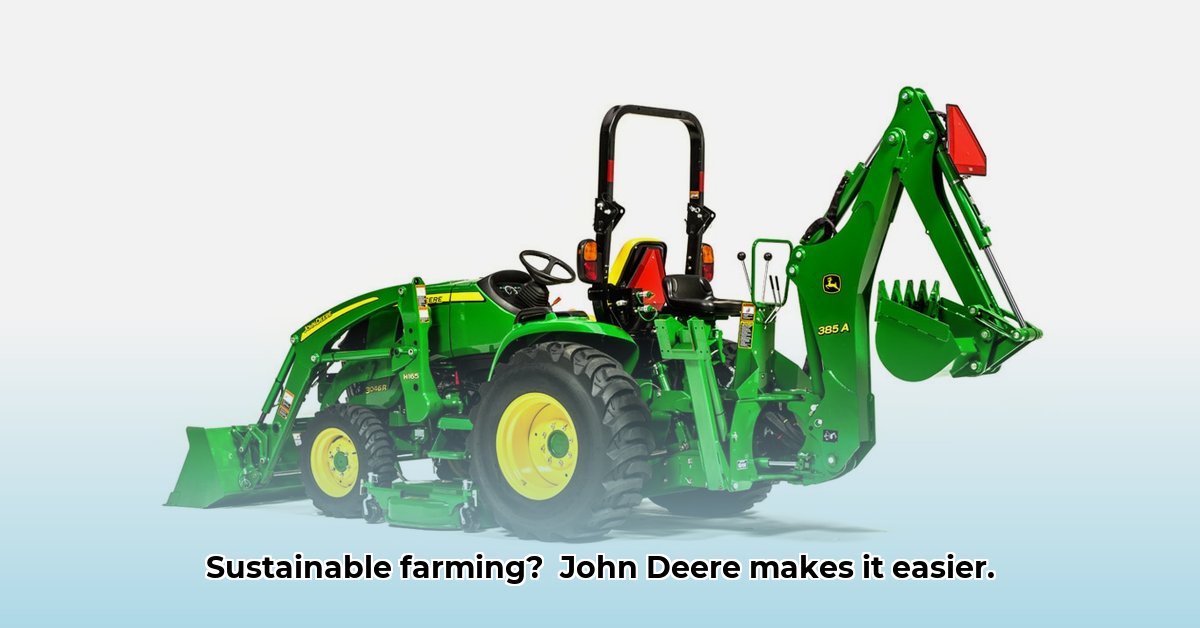
John Deere Backhoes: Your Partners in Sustainable Agriculture
John Deere tractor loader backhoes are transforming sustainable farming practices. Their versatility extends beyond simple digging; these machines are key to efficient water management, responsible land clearing, and optimized material handling – all contributing to environmentally friendly farming. This guide provides actionable steps for selecting, operating, and maintaining these machines for maximum sustainability. Learn more about John Deere backhoes here.
Versatility and Sustainable Applications of John Deere Backhoes
John Deere backhoes offer unparalleled versatility in sustainable agriculture. Need to install a precise irrigation system to minimize water waste? A backhoe's precise digging capabilities excel in this task. Facing the challenge of land clearing for improved crop rotation? A backhoe efficiently removes obstacles and prepares the land for optimal planting. Efficient material handling, including moving fertilizers or compost, further streamlines farming operations. This multifaceted capability reduces fuel consumption compared to using multiple specialized machines, contributing to a smaller environmental footprint.
Choosing the Right John Deere Backhoe Model: A Selection Guide
Selecting the appropriate backhoe model is crucial for both efficiency and sustainability. Consider your farm's size, specific needs, and budget. A smaller farm might only need a compact model, while a large-scale operation might require a heavy-duty machine. Consult with your local John Deere dealer; they provide expertise to ensure you select the best model suited to your specific context.
Here’s a simplified guide to help you make the right decision:
| Model Category | Ideal Farm Size | Primary Applications | Key Considerations |
|---|---|---|---|
| Compact Backhoes | Small to Medium Farms | Irrigation, light land clearing, general utility tasks | Excellent maneuverability, potentially shallower digging depth |
| Utility Backhoes | Medium to Large Farms | Irrigation, land clearing, heavy material handling | Increased power, greater digging depth, higher lifting capacity |
| Heavy-Duty Backhoes | Large Farms | Extensive land clearing, large-scale projects | Maximum power and durability for demanding tasks |
Sustainable Practices for Operating Your John Deere Backhoe
Sustainable backhoe operation significantly impacts your farm's environmental footprint and long-term costs. Follow these best practices:
Minimize Soil Compaction: Use reduced tire pressure, especially on wet soil. Avoid repeated passes in the same area. Research suggests wider tires can improve soil management. Isn't reducing soil compaction essential for healthy plant growth and long-term soil health?
Protect Habitats and Wildlife: Carefully plan your work, avoiding sensitive ecosystems. Minimize ground disturbance near wetlands or areas with protected species. Consider consulting with a local environmental expert to minimize impact. Protecting biodiversity is not just environmentally responsible; it's crucial for the long-term viability of your farm.
Maximize Fuel Efficiency: Regular maintenance is vital for maximizing fuel efficiency. Avoid unnecessary idling. Training operators on fuel-efficient techniques significantly reduces consumption. Did you know that proper machine maintenance can improve fuel efficiency by up to 15%?
Responsible Maintenance and Disposal: Regular maintenance extends equipment lifespan, reducing waste from premature replacements. Ensure proper disposal of used fluids and parts. Proactive maintenance translates to significant cost savings in the long run, reducing the environmental impact of replacing equipment prematurely.
Addressing Sustainability Concerns: The Bigger Picture
While John Deere is committed to sustainability, comprehensive lifecycle emission data for all backhoe models remains under development. More research is needed to fully assess the long-term environmental impact of these machines. This includes a thorough investigation of the manufacturing process, material sourcing, and end-of-life disposal. The industry is actively working towards greater transparency and data collection in this area.
Long-Term Considerations: Investment and Future Regulations
Investing in a John Deere backhoe requires a thorough lifecycle cost analysis, encompassing initial purchase price, fuel costs, maintenance, and potential repairs. Exploring alternative fuels, such as biodiesel or future electric options, is a crucial element of long-term sustainability. Staying updated on evolving regulations concerning emissions and sustainable agriculture practices is paramount for responsible and future-proof farming.
Conclusion: Building a Sustainable Future
John Deere backhoes are valuable tools boosting farming efficiency. However, responsible operation, informed decision-making, and a commitment to ongoing improvement are paramount for building a truly sustainable agriculture future. Consult your local John Deere dealer for expert advice and support in building a sustainable farming system. Let's work together towards more environmentally conscious farming practices!